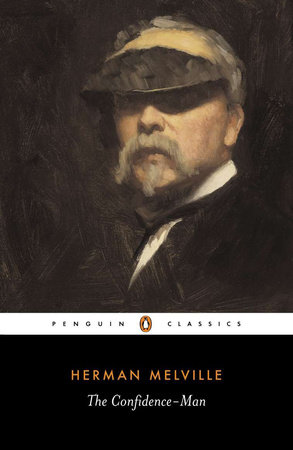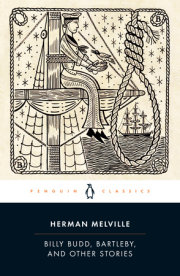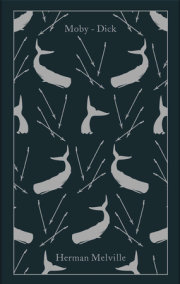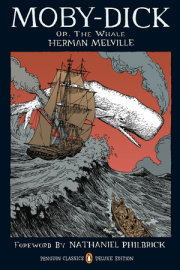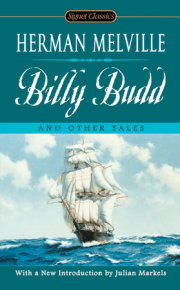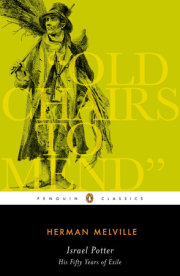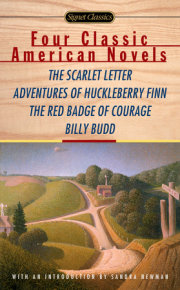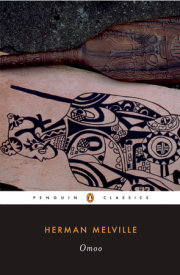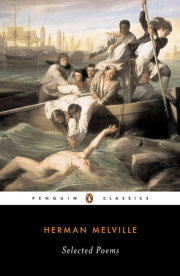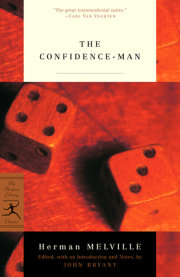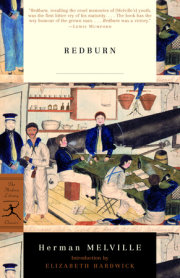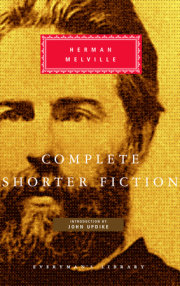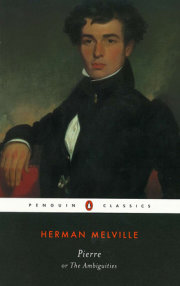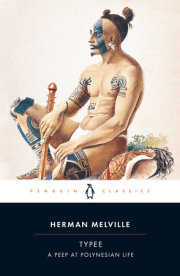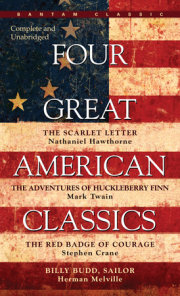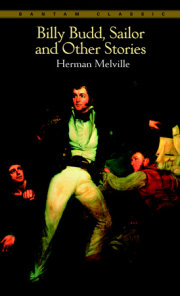Onboard the Fidèle, a steamboat floating down the Mississippi to New Orleans, a confidence man sets out to defraud his fellow passengers. In quick succession he assumes numerous guises - from a legless beggar and a worldly businessman to a collector for charitable causes and a 'cosmopolitan' gentleman, who simply swindles a barber out of the price of a shave. Making very little from his hoaxes, the pleasure of trickery seems an end in itself for this slippery conman. Is he the Devil? Is his chicanery merely intended to expose the mercenary concerns of those around him? Set on April Fool's Day, The Confidence-Man (1857) is an engaging comedy of masquerades, digressions and shifting identity, and a devastating satire on the American dream.
For more than seventy years, Penguin has been the leading publisher of classic literature in the English-speaking world. With more than 1,700 titles, Penguin Classics represents a global bookshelf of the best works throughout history and across genres and disciplines. Readers trust the series to provide authoritative texts enhanced by introductions and notes by distinguished scholars and contemporary authors, as well as up-to-date translations by award-winning translators.
For more than seventy years, Penguin has been the leading publisher of classic literature in the English-speaking world. With more than 1,700 titles, Penguin Classics represents a global bookshelf of the best works throughout history and across genres and disciplines. Readers trust the series to provide authoritative texts enhanced by introductions and notes by distinguished scholars and contemporary authors, as well as up-to-date translations by award-winning translators.
“The great transcendental satire.” —Carl Van Vechten
CHAPTER I
A mute goes aboard a boat on the Mississippi
At sunrise on a first of April, there appeared, suddenly as Manco Capac at the lake Titicaca, a man in cream-colors, at the water-side in the city of St. Louis.
His cheek was fair, his chin downy, his hair flaxen, his hat a white fur one, with a long fleecy nap. He had neither trunk, valise, carpet-bag, nor parcel. No porter followed him. He was unaccompanied by friends. From the shrugged shoulders, titters, whispers, wonderings of the crowd, it was plain that he was, in the extremest sense of the word, a stranger.
In the same moment with his advent, he stepped aboard the favorite steamer Fidèle, on the point of starting for New Orleans. Stared at, but unsaluted, with the air of one neither courting nor shunning regard, but evenly pursuing the path of duty, lead it through solitudes or cities, he held on his way along the lower deck until he chanced to come to a placard nigh the captain’s office, offering a reward for the capture of a mysterious impostor, supposed to have recently arrived from the East; quite an original genius in his vocation, as would appear, though wherein his originality consisted was not clearly given; but what purported to be a careful description of his person followed.
As if it had been a theatre-bill, crowds were gathered about the announcement, and among them certain chevaliers, whose eyes, it was plain, were on the capitals, or, at least, earnestly seeking sight of them from behind intervening coats; but as for their fingers, they were enveloped in some myth; though, during a chance interval, one of these chevaliers somewhat showed his hand in purchasing from another chevalier, ex-officio a peddler of money-belts, one of his popular safe-guards, while another peddler, who was still another versatile chevalier, hawked, in the thick of the throng, the lives of Measan, the bandit of Ohio, Murrel, the pirate of the Mississippi, and the brothers Harpe, the Thugs of the Green River country, in Kentucky—creatures, with others of the sort, one and all exterminated at the time, and for the most part, like the hunted generations of wolves in the same regions, leaving comparatively few successors; which would seem cause for unalloyed gratulation, and is such to all except those who think that in new countries, where the wolves are killed off, the foxes increase.
Pausing at this spot, the stranger so far succeeded in threading his way, as at last to plant himself just beside the placard, when, producing a small slate and tracing some words upon it, he held it up before him on a level with the placard, so that they who read the one might read the other. The words were these:—
“Charity thinketh no evil.”
As, in gaining his place, some little perseverance, not to say persistence, of a mildly inoffensive sort, had been unavoidable, it was not with the best relish that the crowd regarded his apparent intrusion; and upon a more attentive survey, perceiving no badge of authority about him, but rather something quite the contrary—he being of an aspect so singularly innocent; an aspect, too, which they took to be somehow inappropriate to the time and place, and inclining to the notion that his writing was of much the same sort: in short, taking him for some strange kind of simpleton, harmless enough, would he keep to himself, but not wholly unobnoxious as an intruder—they made no scruple to jostle him aside; while one, less kind than the rest, or more of a wag, by an unobserved stroke, dexterously flattened down his fleecy hat upon his head. Without readjusting it, the stranger quietly turned, and writing anew upon the slate, again held it up:—
“Charity suffereth long, and is kind.”
Illy pleased with his pertinacity, as they thought it, the crowd a second time thrust him aside, and not without epithets and some buffets, all of which were unresented. But, as if at last despairing of so difficult an adventure, wherein one, apparently a non-resistant, sought to impose his presence upon fighting characters, the stranger now moved slowly away, yet not before altering his writing to this:—
“Charity endureth all things.”
Shield-like bearing his slate before him, amid stares and jeers he moved slowly up and down, at his turning points again changing his inscription to—
“Charity believeth all things.”
and then—
“Charity never faileth.”
The word charity, as originally traced, remained throughout uneffaced, not unlike the left-hand numeral of a printed date, otherwise left for convenience in blank.
To some observers, the singularity, if not lunacy, of the stranger was heightened by his muteness, and, perhaps also, by the contrast to his proceedings afforded in the actions—quite in the wonted and sensible order of things—of the barber of the boat, whose quarters, under a smoking-saloon, and over against a bar-room, was next door but two to the captain’s office. As if the long, wide, covered deck, hereabouts built up on both sides with shop-like windowed spaces, were some Constantinople arcade or bazaar, where more than one trade is plied, this river barber, aproned and slippered, but rather crusty-looking for the moment, it may be from being newly out of bed, was throwing open his premises for the day, and suitably arranging the exterior. With business-like dispatch, having rattled down his shutters, and at a palm-tree angle set out in the iron fixture his little ornamental pole, and this without overmuch tenderness for the elbows and toes of the crowd, he concluded his operations by bidding people stand still more aside, when, jumping on a stool, he hung over his door, on the customary nail, a gaudy sort of illuminated pasteboard sign, skillfully executed by himself, gilt with the likeness of a razor elbowed in readiness to shave, and also, for the public benefit, with two words not unfrequently seen ashore gracing other shops besides barbers’:—
“No trust.”
An inscription which, though in a sense not less intrusive than the contrasted ones of the stranger, did not, as it seemed, provoke any corresponding derision or surprise, much less indignation; and still less, to all appearances, did it gain for the inscriber the repute of being a simpleton.
Meanwhile, he with the slate continued moving slowly up and down, not without causing some stares to change into jeers, and some jeers into pushes, and some pushes into punches; when suddenly, in one of his turns, he was hailed from behind by two porters carrying a large trunk; but as the summons, though loud, was without effect, they accidentally or otherwise swung their burden against him, nearly overthrowing him; when, by a quick start, a peculiar inarticulate moan, and a pathetic telegraphing of his fingers, he involuntarily betrayed that he was not alone dumb, but also deaf.
Presently, as if not wholly unaffected by his reception thus far, he went forward, seating himself in a retired spot on the forecastle, nigh the foot of a ladder there leading to a deck above, up and down which ladder some of the boatmen, in discharge of their duties, were occasionally going.
From his betaking himself to this humble quarter, it was evident that, as a deck-passenger, the stranger, simple though he seemed, was not entirely ignorant of his place, though his taking a deck-passage might have been partly for convenience; as, from his having no luggage, it was probable that his destination was one of the small wayside landings within a few hours’ sail. But, though he might not have a long way to go, yet he seemed already to have come from a very long distance.
Though neither soiled nor slovenly, his cream-colored suit had a tossed look, almost linty, as if, traveling night and day from some far country beyond the prairies, he had long been without the solace of a bed. His aspect was at once gentle and jaded, and, from the moment of seating himself, increasing in tired abstraction and dreaminess. Gradually overtaken by slumber, his flaxen head drooped, his whole lamb-like figure relaxed, and, half reclining against the ladder’s foot, lay motionless, as some sugar-snow in March, which, softly stealing down over night, with its white placidity startles the brown farmer peering out from his threshold at daybreak.
A mute goes aboard a boat on the Mississippi
At sunrise on a first of April, there appeared, suddenly as Manco Capac at the lake Titicaca, a man in cream-colors, at the water-side in the city of St. Louis.
His cheek was fair, his chin downy, his hair flaxen, his hat a white fur one, with a long fleecy nap. He had neither trunk, valise, carpet-bag, nor parcel. No porter followed him. He was unaccompanied by friends. From the shrugged shoulders, titters, whispers, wonderings of the crowd, it was plain that he was, in the extremest sense of the word, a stranger.
In the same moment with his advent, he stepped aboard the favorite steamer Fidèle, on the point of starting for New Orleans. Stared at, but unsaluted, with the air of one neither courting nor shunning regard, but evenly pursuing the path of duty, lead it through solitudes or cities, he held on his way along the lower deck until he chanced to come to a placard nigh the captain’s office, offering a reward for the capture of a mysterious impostor, supposed to have recently arrived from the East; quite an original genius in his vocation, as would appear, though wherein his originality consisted was not clearly given; but what purported to be a careful description of his person followed.
As if it had been a theatre-bill, crowds were gathered about the announcement, and among them certain chevaliers, whose eyes, it was plain, were on the capitals, or, at least, earnestly seeking sight of them from behind intervening coats; but as for their fingers, they were enveloped in some myth; though, during a chance interval, one of these chevaliers somewhat showed his hand in purchasing from another chevalier, ex-officio a peddler of money-belts, one of his popular safe-guards, while another peddler, who was still another versatile chevalier, hawked, in the thick of the throng, the lives of Measan, the bandit of Ohio, Murrel, the pirate of the Mississippi, and the brothers Harpe, the Thugs of the Green River country, in Kentucky—creatures, with others of the sort, one and all exterminated at the time, and for the most part, like the hunted generations of wolves in the same regions, leaving comparatively few successors; which would seem cause for unalloyed gratulation, and is such to all except those who think that in new countries, where the wolves are killed off, the foxes increase.
Pausing at this spot, the stranger so far succeeded in threading his way, as at last to plant himself just beside the placard, when, producing a small slate and tracing some words upon it, he held it up before him on a level with the placard, so that they who read the one might read the other. The words were these:—
“Charity thinketh no evil.”
As, in gaining his place, some little perseverance, not to say persistence, of a mildly inoffensive sort, had been unavoidable, it was not with the best relish that the crowd regarded his apparent intrusion; and upon a more attentive survey, perceiving no badge of authority about him, but rather something quite the contrary—he being of an aspect so singularly innocent; an aspect, too, which they took to be somehow inappropriate to the time and place, and inclining to the notion that his writing was of much the same sort: in short, taking him for some strange kind of simpleton, harmless enough, would he keep to himself, but not wholly unobnoxious as an intruder—they made no scruple to jostle him aside; while one, less kind than the rest, or more of a wag, by an unobserved stroke, dexterously flattened down his fleecy hat upon his head. Without readjusting it, the stranger quietly turned, and writing anew upon the slate, again held it up:—
“Charity suffereth long, and is kind.”
Illy pleased with his pertinacity, as they thought it, the crowd a second time thrust him aside, and not without epithets and some buffets, all of which were unresented. But, as if at last despairing of so difficult an adventure, wherein one, apparently a non-resistant, sought to impose his presence upon fighting characters, the stranger now moved slowly away, yet not before altering his writing to this:—
“Charity endureth all things.”
Shield-like bearing his slate before him, amid stares and jeers he moved slowly up and down, at his turning points again changing his inscription to—
“Charity believeth all things.”
and then—
“Charity never faileth.”
The word charity, as originally traced, remained throughout uneffaced, not unlike the left-hand numeral of a printed date, otherwise left for convenience in blank.
To some observers, the singularity, if not lunacy, of the stranger was heightened by his muteness, and, perhaps also, by the contrast to his proceedings afforded in the actions—quite in the wonted and sensible order of things—of the barber of the boat, whose quarters, under a smoking-saloon, and over against a bar-room, was next door but two to the captain’s office. As if the long, wide, covered deck, hereabouts built up on both sides with shop-like windowed spaces, were some Constantinople arcade or bazaar, where more than one trade is plied, this river barber, aproned and slippered, but rather crusty-looking for the moment, it may be from being newly out of bed, was throwing open his premises for the day, and suitably arranging the exterior. With business-like dispatch, having rattled down his shutters, and at a palm-tree angle set out in the iron fixture his little ornamental pole, and this without overmuch tenderness for the elbows and toes of the crowd, he concluded his operations by bidding people stand still more aside, when, jumping on a stool, he hung over his door, on the customary nail, a gaudy sort of illuminated pasteboard sign, skillfully executed by himself, gilt with the likeness of a razor elbowed in readiness to shave, and also, for the public benefit, with two words not unfrequently seen ashore gracing other shops besides barbers’:—
“No trust.”
An inscription which, though in a sense not less intrusive than the contrasted ones of the stranger, did not, as it seemed, provoke any corresponding derision or surprise, much less indignation; and still less, to all appearances, did it gain for the inscriber the repute of being a simpleton.
Meanwhile, he with the slate continued moving slowly up and down, not without causing some stares to change into jeers, and some jeers into pushes, and some pushes into punches; when suddenly, in one of his turns, he was hailed from behind by two porters carrying a large trunk; but as the summons, though loud, was without effect, they accidentally or otherwise swung their burden against him, nearly overthrowing him; when, by a quick start, a peculiar inarticulate moan, and a pathetic telegraphing of his fingers, he involuntarily betrayed that he was not alone dumb, but also deaf.
Presently, as if not wholly unaffected by his reception thus far, he went forward, seating himself in a retired spot on the forecastle, nigh the foot of a ladder there leading to a deck above, up and down which ladder some of the boatmen, in discharge of their duties, were occasionally going.
From his betaking himself to this humble quarter, it was evident that, as a deck-passenger, the stranger, simple though he seemed, was not entirely ignorant of his place, though his taking a deck-passage might have been partly for convenience; as, from his having no luggage, it was probable that his destination was one of the small wayside landings within a few hours’ sail. But, though he might not have a long way to go, yet he seemed already to have come from a very long distance.
Though neither soiled nor slovenly, his cream-colored suit had a tossed look, almost linty, as if, traveling night and day from some far country beyond the prairies, he had long been without the solace of a bed. His aspect was at once gentle and jaded, and, from the moment of seating himself, increasing in tired abstraction and dreaminess. Gradually overtaken by slumber, his flaxen head drooped, his whole lamb-like figure relaxed, and, half reclining against the ladder’s foot, lay motionless, as some sugar-snow in March, which, softly stealing down over night, with its white placidity startles the brown farmer peering out from his threshold at daybreak.
Copyright © 2003 by Herman Melville. All rights reserved. No part of this excerpt may be reproduced or reprinted without permission in writing from the publisher.
About
Onboard the Fidèle, a steamboat floating down the Mississippi to New Orleans, a confidence man sets out to defraud his fellow passengers. In quick succession he assumes numerous guises - from a legless beggar and a worldly businessman to a collector for charitable causes and a 'cosmopolitan' gentleman, who simply swindles a barber out of the price of a shave. Making very little from his hoaxes, the pleasure of trickery seems an end in itself for this slippery conman. Is he the Devil? Is his chicanery merely intended to expose the mercenary concerns of those around him? Set on April Fool's Day, The Confidence-Man (1857) is an engaging comedy of masquerades, digressions and shifting identity, and a devastating satire on the American dream.
For more than seventy years, Penguin has been the leading publisher of classic literature in the English-speaking world. With more than 1,700 titles, Penguin Classics represents a global bookshelf of the best works throughout history and across genres and disciplines. Readers trust the series to provide authoritative texts enhanced by introductions and notes by distinguished scholars and contemporary authors, as well as up-to-date translations by award-winning translators.
For more than seventy years, Penguin has been the leading publisher of classic literature in the English-speaking world. With more than 1,700 titles, Penguin Classics represents a global bookshelf of the best works throughout history and across genres and disciplines. Readers trust the series to provide authoritative texts enhanced by introductions and notes by distinguished scholars and contemporary authors, as well as up-to-date translations by award-winning translators.
Praise
“The great transcendental satire.” —Carl Van Vechten
Author
Excerpt
CHAPTER I
A mute goes aboard a boat on the Mississippi
At sunrise on a first of April, there appeared, suddenly as Manco Capac at the lake Titicaca, a man in cream-colors, at the water-side in the city of St. Louis.
His cheek was fair, his chin downy, his hair flaxen, his hat a white fur one, with a long fleecy nap. He had neither trunk, valise, carpet-bag, nor parcel. No porter followed him. He was unaccompanied by friends. From the shrugged shoulders, titters, whispers, wonderings of the crowd, it was plain that he was, in the extremest sense of the word, a stranger.
In the same moment with his advent, he stepped aboard the favorite steamer Fidèle, on the point of starting for New Orleans. Stared at, but unsaluted, with the air of one neither courting nor shunning regard, but evenly pursuing the path of duty, lead it through solitudes or cities, he held on his way along the lower deck until he chanced to come to a placard nigh the captain’s office, offering a reward for the capture of a mysterious impostor, supposed to have recently arrived from the East; quite an original genius in his vocation, as would appear, though wherein his originality consisted was not clearly given; but what purported to be a careful description of his person followed.
As if it had been a theatre-bill, crowds were gathered about the announcement, and among them certain chevaliers, whose eyes, it was plain, were on the capitals, or, at least, earnestly seeking sight of them from behind intervening coats; but as for their fingers, they were enveloped in some myth; though, during a chance interval, one of these chevaliers somewhat showed his hand in purchasing from another chevalier, ex-officio a peddler of money-belts, one of his popular safe-guards, while another peddler, who was still another versatile chevalier, hawked, in the thick of the throng, the lives of Measan, the bandit of Ohio, Murrel, the pirate of the Mississippi, and the brothers Harpe, the Thugs of the Green River country, in Kentucky—creatures, with others of the sort, one and all exterminated at the time, and for the most part, like the hunted generations of wolves in the same regions, leaving comparatively few successors; which would seem cause for unalloyed gratulation, and is such to all except those who think that in new countries, where the wolves are killed off, the foxes increase.
Pausing at this spot, the stranger so far succeeded in threading his way, as at last to plant himself just beside the placard, when, producing a small slate and tracing some words upon it, he held it up before him on a level with the placard, so that they who read the one might read the other. The words were these:—
“Charity thinketh no evil.”
As, in gaining his place, some little perseverance, not to say persistence, of a mildly inoffensive sort, had been unavoidable, it was not with the best relish that the crowd regarded his apparent intrusion; and upon a more attentive survey, perceiving no badge of authority about him, but rather something quite the contrary—he being of an aspect so singularly innocent; an aspect, too, which they took to be somehow inappropriate to the time and place, and inclining to the notion that his writing was of much the same sort: in short, taking him for some strange kind of simpleton, harmless enough, would he keep to himself, but not wholly unobnoxious as an intruder—they made no scruple to jostle him aside; while one, less kind than the rest, or more of a wag, by an unobserved stroke, dexterously flattened down his fleecy hat upon his head. Without readjusting it, the stranger quietly turned, and writing anew upon the slate, again held it up:—
“Charity suffereth long, and is kind.”
Illy pleased with his pertinacity, as they thought it, the crowd a second time thrust him aside, and not without epithets and some buffets, all of which were unresented. But, as if at last despairing of so difficult an adventure, wherein one, apparently a non-resistant, sought to impose his presence upon fighting characters, the stranger now moved slowly away, yet not before altering his writing to this:—
“Charity endureth all things.”
Shield-like bearing his slate before him, amid stares and jeers he moved slowly up and down, at his turning points again changing his inscription to—
“Charity believeth all things.”
and then—
“Charity never faileth.”
The word charity, as originally traced, remained throughout uneffaced, not unlike the left-hand numeral of a printed date, otherwise left for convenience in blank.
To some observers, the singularity, if not lunacy, of the stranger was heightened by his muteness, and, perhaps also, by the contrast to his proceedings afforded in the actions—quite in the wonted and sensible order of things—of the barber of the boat, whose quarters, under a smoking-saloon, and over against a bar-room, was next door but two to the captain’s office. As if the long, wide, covered deck, hereabouts built up on both sides with shop-like windowed spaces, were some Constantinople arcade or bazaar, where more than one trade is plied, this river barber, aproned and slippered, but rather crusty-looking for the moment, it may be from being newly out of bed, was throwing open his premises for the day, and suitably arranging the exterior. With business-like dispatch, having rattled down his shutters, and at a palm-tree angle set out in the iron fixture his little ornamental pole, and this without overmuch tenderness for the elbows and toes of the crowd, he concluded his operations by bidding people stand still more aside, when, jumping on a stool, he hung over his door, on the customary nail, a gaudy sort of illuminated pasteboard sign, skillfully executed by himself, gilt with the likeness of a razor elbowed in readiness to shave, and also, for the public benefit, with two words not unfrequently seen ashore gracing other shops besides barbers’:—
“No trust.”
An inscription which, though in a sense not less intrusive than the contrasted ones of the stranger, did not, as it seemed, provoke any corresponding derision or surprise, much less indignation; and still less, to all appearances, did it gain for the inscriber the repute of being a simpleton.
Meanwhile, he with the slate continued moving slowly up and down, not without causing some stares to change into jeers, and some jeers into pushes, and some pushes into punches; when suddenly, in one of his turns, he was hailed from behind by two porters carrying a large trunk; but as the summons, though loud, was without effect, they accidentally or otherwise swung their burden against him, nearly overthrowing him; when, by a quick start, a peculiar inarticulate moan, and a pathetic telegraphing of his fingers, he involuntarily betrayed that he was not alone dumb, but also deaf.
Presently, as if not wholly unaffected by his reception thus far, he went forward, seating himself in a retired spot on the forecastle, nigh the foot of a ladder there leading to a deck above, up and down which ladder some of the boatmen, in discharge of their duties, were occasionally going.
From his betaking himself to this humble quarter, it was evident that, as a deck-passenger, the stranger, simple though he seemed, was not entirely ignorant of his place, though his taking a deck-passage might have been partly for convenience; as, from his having no luggage, it was probable that his destination was one of the small wayside landings within a few hours’ sail. But, though he might not have a long way to go, yet he seemed already to have come from a very long distance.
Though neither soiled nor slovenly, his cream-colored suit had a tossed look, almost linty, as if, traveling night and day from some far country beyond the prairies, he had long been without the solace of a bed. His aspect was at once gentle and jaded, and, from the moment of seating himself, increasing in tired abstraction and dreaminess. Gradually overtaken by slumber, his flaxen head drooped, his whole lamb-like figure relaxed, and, half reclining against the ladder’s foot, lay motionless, as some sugar-snow in March, which, softly stealing down over night, with its white placidity startles the brown farmer peering out from his threshold at daybreak.
A mute goes aboard a boat on the Mississippi
At sunrise on a first of April, there appeared, suddenly as Manco Capac at the lake Titicaca, a man in cream-colors, at the water-side in the city of St. Louis.
His cheek was fair, his chin downy, his hair flaxen, his hat a white fur one, with a long fleecy nap. He had neither trunk, valise, carpet-bag, nor parcel. No porter followed him. He was unaccompanied by friends. From the shrugged shoulders, titters, whispers, wonderings of the crowd, it was plain that he was, in the extremest sense of the word, a stranger.
In the same moment with his advent, he stepped aboard the favorite steamer Fidèle, on the point of starting for New Orleans. Stared at, but unsaluted, with the air of one neither courting nor shunning regard, but evenly pursuing the path of duty, lead it through solitudes or cities, he held on his way along the lower deck until he chanced to come to a placard nigh the captain’s office, offering a reward for the capture of a mysterious impostor, supposed to have recently arrived from the East; quite an original genius in his vocation, as would appear, though wherein his originality consisted was not clearly given; but what purported to be a careful description of his person followed.
As if it had been a theatre-bill, crowds were gathered about the announcement, and among them certain chevaliers, whose eyes, it was plain, were on the capitals, or, at least, earnestly seeking sight of them from behind intervening coats; but as for their fingers, they were enveloped in some myth; though, during a chance interval, one of these chevaliers somewhat showed his hand in purchasing from another chevalier, ex-officio a peddler of money-belts, one of his popular safe-guards, while another peddler, who was still another versatile chevalier, hawked, in the thick of the throng, the lives of Measan, the bandit of Ohio, Murrel, the pirate of the Mississippi, and the brothers Harpe, the Thugs of the Green River country, in Kentucky—creatures, with others of the sort, one and all exterminated at the time, and for the most part, like the hunted generations of wolves in the same regions, leaving comparatively few successors; which would seem cause for unalloyed gratulation, and is such to all except those who think that in new countries, where the wolves are killed off, the foxes increase.
Pausing at this spot, the stranger so far succeeded in threading his way, as at last to plant himself just beside the placard, when, producing a small slate and tracing some words upon it, he held it up before him on a level with the placard, so that they who read the one might read the other. The words were these:—
“Charity thinketh no evil.”
As, in gaining his place, some little perseverance, not to say persistence, of a mildly inoffensive sort, had been unavoidable, it was not with the best relish that the crowd regarded his apparent intrusion; and upon a more attentive survey, perceiving no badge of authority about him, but rather something quite the contrary—he being of an aspect so singularly innocent; an aspect, too, which they took to be somehow inappropriate to the time and place, and inclining to the notion that his writing was of much the same sort: in short, taking him for some strange kind of simpleton, harmless enough, would he keep to himself, but not wholly unobnoxious as an intruder—they made no scruple to jostle him aside; while one, less kind than the rest, or more of a wag, by an unobserved stroke, dexterously flattened down his fleecy hat upon his head. Without readjusting it, the stranger quietly turned, and writing anew upon the slate, again held it up:—
“Charity suffereth long, and is kind.”
Illy pleased with his pertinacity, as they thought it, the crowd a second time thrust him aside, and not without epithets and some buffets, all of which were unresented. But, as if at last despairing of so difficult an adventure, wherein one, apparently a non-resistant, sought to impose his presence upon fighting characters, the stranger now moved slowly away, yet not before altering his writing to this:—
“Charity endureth all things.”
Shield-like bearing his slate before him, amid stares and jeers he moved slowly up and down, at his turning points again changing his inscription to—
“Charity believeth all things.”
and then—
“Charity never faileth.”
The word charity, as originally traced, remained throughout uneffaced, not unlike the left-hand numeral of a printed date, otherwise left for convenience in blank.
To some observers, the singularity, if not lunacy, of the stranger was heightened by his muteness, and, perhaps also, by the contrast to his proceedings afforded in the actions—quite in the wonted and sensible order of things—of the barber of the boat, whose quarters, under a smoking-saloon, and over against a bar-room, was next door but two to the captain’s office. As if the long, wide, covered deck, hereabouts built up on both sides with shop-like windowed spaces, were some Constantinople arcade or bazaar, where more than one trade is plied, this river barber, aproned and slippered, but rather crusty-looking for the moment, it may be from being newly out of bed, was throwing open his premises for the day, and suitably arranging the exterior. With business-like dispatch, having rattled down his shutters, and at a palm-tree angle set out in the iron fixture his little ornamental pole, and this without overmuch tenderness for the elbows and toes of the crowd, he concluded his operations by bidding people stand still more aside, when, jumping on a stool, he hung over his door, on the customary nail, a gaudy sort of illuminated pasteboard sign, skillfully executed by himself, gilt with the likeness of a razor elbowed in readiness to shave, and also, for the public benefit, with two words not unfrequently seen ashore gracing other shops besides barbers’:—
“No trust.”
An inscription which, though in a sense not less intrusive than the contrasted ones of the stranger, did not, as it seemed, provoke any corresponding derision or surprise, much less indignation; and still less, to all appearances, did it gain for the inscriber the repute of being a simpleton.
Meanwhile, he with the slate continued moving slowly up and down, not without causing some stares to change into jeers, and some jeers into pushes, and some pushes into punches; when suddenly, in one of his turns, he was hailed from behind by two porters carrying a large trunk; but as the summons, though loud, was without effect, they accidentally or otherwise swung their burden against him, nearly overthrowing him; when, by a quick start, a peculiar inarticulate moan, and a pathetic telegraphing of his fingers, he involuntarily betrayed that he was not alone dumb, but also deaf.
Presently, as if not wholly unaffected by his reception thus far, he went forward, seating himself in a retired spot on the forecastle, nigh the foot of a ladder there leading to a deck above, up and down which ladder some of the boatmen, in discharge of their duties, were occasionally going.
From his betaking himself to this humble quarter, it was evident that, as a deck-passenger, the stranger, simple though he seemed, was not entirely ignorant of his place, though his taking a deck-passage might have been partly for convenience; as, from his having no luggage, it was probable that his destination was one of the small wayside landings within a few hours’ sail. But, though he might not have a long way to go, yet he seemed already to have come from a very long distance.
Though neither soiled nor slovenly, his cream-colored suit had a tossed look, almost linty, as if, traveling night and day from some far country beyond the prairies, he had long been without the solace of a bed. His aspect was at once gentle and jaded, and, from the moment of seating himself, increasing in tired abstraction and dreaminess. Gradually overtaken by slumber, his flaxen head drooped, his whole lamb-like figure relaxed, and, half reclining against the ladder’s foot, lay motionless, as some sugar-snow in March, which, softly stealing down over night, with its white placidity startles the brown farmer peering out from his threshold at daybreak.
Copyright © 2003 by Herman Melville. All rights reserved. No part of this excerpt may be reproduced or reprinted without permission in writing from the publisher.
Back to Top
Notifications






